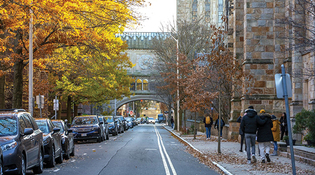
Bob Handelman
The block of High Street between Chapel and Elm will be closed to vehicular traffic as part of a new agreement between the university and the city of New Haven
View full image
Responding to a growing demand from New Haven officials and activists to increase its annual voluntary financial contribution to its home city, Yale announced in November that it will raise its payments, from a total of $83.4 million over the next six years to a total of $135.4 million.
“Yale loves New Haven,” said President Peter Salovey ’86PhD at a City Hall event announcing the deal. “The new commitments we make today are informed by decades of engagement and service offered by members of the Yale community, and they are given purpose, shape, and energy by the good people of our wonderful city.”
Yale’s contribution to New Haven has been a bone of contention with the city for decades, primarily because of Connecticut’s tax structure. Cities and towns rely on property taxes for most of their revenue; this hurts cities like New Haven, where 60 percent of property is tax-exempt (much of it Yale’s). A state program reimburses cities partially for the lost taxes, but it frequently has been underfunded. This year, the state changed the formula, allotting New Haven $90 million instead of the $41 million it would have received under the old formula—another big win for the city budget.
Yale first began making voluntary payments to the city in 1990. The formula has changed over the years, and the amount has increased: in 2021 the university is paying $13 million, which Yale says is more than any other US university pays its host city.
But as New Haven found itself increasingly financially squeezed and loath to raise property taxes even further on residents—and as Yale’s endowment grew prodigiously—Yale’s unions and city officials pressured the university to do more. In his first successful election campaign, in 2019, Mayor Justin Elicker ’10MEM, ’10MBA, argued that Yale should pay the city $50 million a year.
The deal announced in November falls far short of that number, but the additional money, combined with the increased reimbursement from the state, more than covers a projected city budget shortfall that Elicker had called on Yale and the state to fill. Yale will pay New Haven an additional $10 million per year for the next five years, then $2 million in the sixth year.
“When you put it in perspective, Yale will be contributing more in the next 6 years than in the past 20,” says Elicker. ”That is a very significant step forward in the dynamic between the university and the city.”
The university also agreed to a plan that will ease the shock to the city budget when Yale buys property and removes it from the tax rolls. In the future, the university will pay 100 percent of the tax on such properties for the first three years after purchase, then a percentage of the tax that decreases to zero after nine more years.
In addition, Yale has committed $5 million to fund a new Center for Inclusive Growth at the university in order to “develop and implement strategies to grow the city economically in a way that benefits all of New Haven’s residents.” School of Management dean Kerwin Charles will help launch the center.
Alongside the revenue deals, Yale and the city announced an agreement to close High Street to vehicular traffic between Chapel and Elm Streets, turning it into a bicycle and pedestrian path. Yale has already converted two other blocks of High Street and two blocks of Wall Street to pedestrian use; it purchased those streets from the city in 2013. In this case, Yale will fund the conversion and maintenance of the street, but the street will remain city property.
 loading
loading